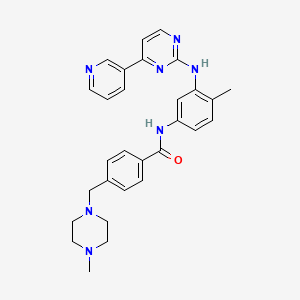m6A-centered Drug Response Information
General Information of the Drug (ID: M6APDG02300)
| Name |
Imatinib
|
||||
|---|---|---|---|---|---|
| Synonyms |
112GI019; 4-(4-METHYL-PIPERAZIN-1-YLMETHYL)-N-[4-METHYL-3-(4-PYRIDIN-3-YL-PYRIMIDIN-2-YLAMINO)-PHENYL]-BENZAMIDE; 4-[(4-Methyl-1-piperazinyl)methyl]-N-[4-methyl-3-[[4-(3-pyridinyl)-2-pyrimidinyl]amino]-phenyl]benzamide; 4-[(4-methyl-1-piperazinyl)methyl]-N-[4-methyl-3-[[4-(3-pyridinyl)-2-pyrimidinyl]amino]phenyl]-benzamide methanesulfonate; 4-[(4-methylpiperazin-1-yl)methyl]-N-(4-methyl-3-{[4-(pyridin-3-yl)pyrimidin-2-yl]amino}phenyl)benzamide; 4-[(4-methylpiperazin-1-yl)methyl]-N-[4-methyl-3-[(4-pyridin-3-ylpyrimidin-2-yl)amino]phenyl]benzamide; 4-[(4-methylpiperazin-1-yl)methyl]-N-{4-methyl-3-[(4-pyridin-3-ylpyrimidin-2-yl)amino]phenyl}benzamide; Alpha-(4-Methyl-1-piperazinyl)-3'-((4-(3-pyridyl)-2-pyrimidinyl)amino)-p-tolu-p-toluidide; Benzamide, 4-[(4-methyl-1-piperazinyl)methyl]-N-[4-methyl-3-[[4-(3-pyridinyl)-2-pyrimidinyl]amino]phenyl]-(9CI); CGP 57148B; Cgp 57148; Glamox; Glamox (TN); Gleevec (TN); Glivec (TN); Imatinib (INN); Imatinib Methansulfonate; Imatinib [INN:BAN]; Imatinib free base; N-(3-(4-(pyridin-3-yl)pyrimidin-2-ylamino)-4-methylphenyl)-4-((4-methylpiperazin-1-yl)methyl)benzamide; STI; STI 571; STI571; Sti-571
Click to Show/Hide
|
||||
| Status |
Approved
|
||||
| Structure |
 |
||||
| Formula |
C29H31N7O
|
||||
| InChI |
1S/C29H31N7O/c1-21-5-10-25(18-27(21)34-29-31-13-11-26(33-29)24-4-3-12-30-19-24)32-28(37)23-8-6-22(7-9-23)20-36-16-14-35(2)15-17-36/h3-13,18-19H,14-17,20H2,1-2H3,(H,32,37)(H,31,33,34)
|
||||
| InChIKey |
KTUFNOKKBVMGRW-UHFFFAOYSA-N
|
||||
| PubChem CID | |||||
| VARIDT Drug ID | |||||
Target Gene(s) and Their Upstream m6A Regulator, Together with the Effect of Target Gene(s) in Drug Response
The target genes involved in drug-target interaction (such as drug-metabolizing enzymes, drug transporters and therapeutic targets) and drug-mediated cell death signaling (including modulating DNA damage and repair capacity, escaping from drug-induced apoptosis, autophagy, cellular metabolic reprogramming, oncogenic bypass signaling, cell microenvironment, cell stemness, etc.) could be regulated by m6A regulator(s) and affected their corresponding drug response. You can browse detailed information on drug-related target gene(s) mediated by m6A regulators.
Breast cancer resistance protein (ABCG2)
Methyltransferase-like 3 (METTL3)
| In total 1 mechanisms lead to this potential drug response | ||||
| Response Summary | Breast cancer resistance protein (ABCG2) is a therapeutic target for Imatinib. The Methyltransferase-like 3 (METTL3) has potential in affecting the response of Imatinib through regulating the expression of Breast cancer resistance protein (ABCG2). | [1], [2] | ||
P-glycoprotein 1 (ABCB1)
Insulin-like growth factor 2 mRNA-binding protein 3 (IGF2BP3)
| In total 1 mechanisms lead to this potential drug response | ||||
| Response Summary | P-glycoprotein 1 (ABCB1) is a therapeutic target for Imatinib. The Insulin-like growth factor 2 mRNA-binding protein 3 (IGF2BP3) has potential in affecting the response of Imatinib through regulating the expression of P-glycoprotein 1 (ABCB1). | [3], [4] | ||
Methyltransferase-like 3 (METTL3)
| In total 1 mechanisms lead to this potential drug response | ||||
| Response Summary | P-glycoprotein 1 (ABCB1) is a therapeutic target for Imatinib. The Methyltransferase-like 3 (METTL3) has potential in affecting the response of Imatinib through regulating the expression of P-glycoprotein 1 (ABCB1). | [1], [4] | ||
References